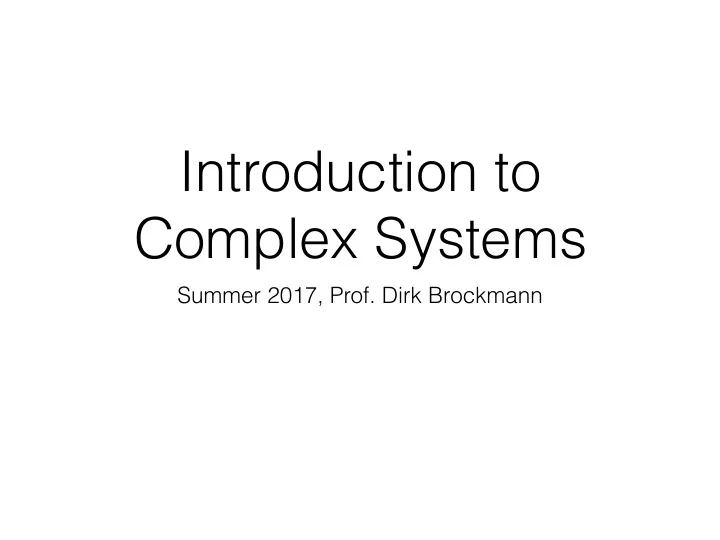

Introduction to Complex Systems Summer 2017, Prof. Dirk Brockmann
Dirk Brockmann • email : dirk.brockmann@hu-berlin.de • phone : +49 30 187542070 • office : Robert-Koch-Institute, Nordufer 20, 13353 Berlin • hours : by appointment • web: http://rocs.hu-berlin.de • twitter: @DirkBrockmann • cell: 49 172 5914795
Survey https://www.surveymonkey.de/r/HP8NTV7
course language german
http://rocs.hu-berlin.de
the module Lecture Seminar Practical Course
Time Lecture: 8:15-9:45am, Thursdays Seminar: 8:15-9:45am, Fridays Practical Course: 2.5.2017 - 12.5.2017
Location
the module Lecture Seminar Practical Course
Lecture
lecture Theoretical Foundation Phenomena 30 % 70 %
Theoretic Foundation 1d flows bifurcation analysis 2d flows 1d maps random walks 10 % 20 % 30 % 20 % 20 %
Complex Adaptive Systems Networks 11 % 11 % Collective Motion Biological Networks 11 % 11 % Growth Processes Chaotic Systems 11 % 11 % Critical Phenomena Synchronization 11 % 11 % Pattern Formation 11 %
Seminar
seminar • 30 minute presentations + 10 minutes Q & A • on research papers • paper pool will be online • flexible choice • each students meets with Dirk once, better twice, before presentation • content • presentation skill
Practical Course
netlogo netlogo is a simple to learn, platform independent, and free programming language that we will use frequently throughout this course. You will need to download a copy and install on your computer. https://ccl.northwestern.edu/netlogo/
example
Homework I Please go to the netlogo documentation page and study 1.) the three tutorials (models, commands, procedures) 2.) the Interface Guide 3.) the Programming Guide On the netlogo documentation page, you'll find links to these on the left.
schedule
Fachkurs 2.5.-12.5.17 27.6.-7.7.17 6.6.-13.6.17 30.5.-9.6.17
Grading • one test will be given after the foundation as a test for you to check what you have learned. The test score will add an optional 20% to your final grade. • At the end of your module a klausur will be given on the theoretic foundation and the phenomena. • your seminar presentation will count towards your final grade as well.
Complex Adaptive Systems Networks 11 % 11 % Collective Motion Biological Networks 11 % 11 % Growth Processes Chaotic Systems 11 % 11 % Critical Phenomena Synchronization 11 % 11 % Pattern Formation 11 %
what are complex systems?
Complex Systems • simple rules generate complex, emergent behavior
Complex Behavior • unpredictable • dynamic • structured • self-similar • emergent • critical • self-organized • pattern forming
Complex Systems • simple rules generate complex, emergent behavior
example: three species
example: network growth
example: the game of life • cells can be dead or alive • Every living cell considers 8 nearest neighbors and counts living neighbors K • when K<2 the cell dies • when K=2 or K=3 the cell lives • when K>3 the cell dies • a dead cell is born when 3 neighbors are alive
Topic Appertizers
Chaotic Systems
http://rocs.hu-berlin.de
fractals
Recommend
More recommend